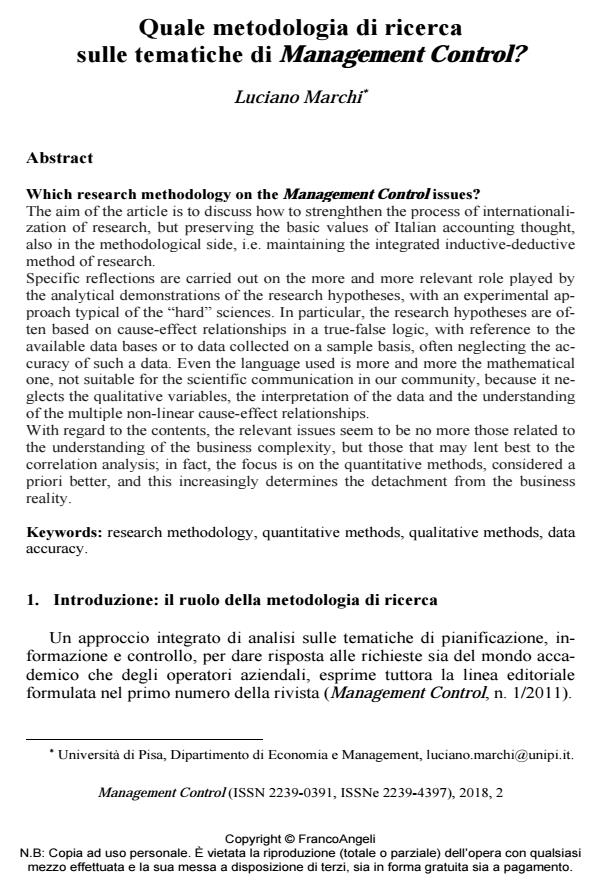Which research methodology on the Management Control issues?
Journal title MANAGEMENT CONTROL
Author/s Luciano Marchi
Publishing Year 2018 Issue 2018/2 Language Italian
Pages 6 P. 5-10 File size 173 KB
DOI 10.3280/MACO2018-002001
DOI is like a bar code for intellectual property: to have more infomation
click here

FrancoAngeli is member of Publishers International Linking Association, Inc (PILA), a not-for-profit association which run the CrossRef service enabling links to and from online scholarly content.
The aim of the article is to discuss how to strenghthen the process of internationali-zation of research, but preserving the basic values of Italian accounting thought, also in the methodological side, i.e. maintaining the integrated inductive-deductive method of research. Specific reflections are carried out on the more and more relevant role played by the analytical demonstrations of the research hypotheses, with an experimental approach typical of the "hard" sciences. In particular, the research hypotheses are often based on cause-effect relationships in a true-false logic, with reference to the available data bases or to data collected on a sample basis, often neglecting the accuracy of such a data. Even the language used is more and more the mathematical one, not suitable for the scientific communication in our community, because it neglects the qualitative variables, the interpretation of the data and the understanding of the multiple non-linear cause-effect relationships. With regard to the contents, the relevant issues seem to be no more those related to the understanding of the business complexity, but those that may lent best to the correlation analysis; in fact, the focus is on the quantitative methods, considered a priori better, and this increasingly determines the detachment from the business reality.
Keywords: Rsearch methodology, quantitative methods, qualitative methods, data accuracy.
- Baldvinsdottir G., Mitchell F., Nørreklit H. (2010), Issues in the relationship between theory and practice in management accounting, Management Accounting Research, 21, pp. 79-82.
- Cinquini L., Miraglia R.A., Giannetti R. (2016), Editoriale. Strumenti di gestione dei costi e misure di performance negli attuali contesti competitivi, Management Control, 2, pp. 5-14. DOI: 10.3280/MACO2016-002001
- Elbashir, M.Z. (2008), Measuring the effects of business intelligence systems: The relationship between business process and organizational performance. International Journal of Accounting Information Systems, 9, 3, pp. 135-153.
- Greco G. (2014), Una comparazione internazionale tra i sistemi di valutazione della ricerca scientifica, Management Control, 1, pp. 87-99. DOI: 10.3280/MACO2014-001006
- Mancini D. (2016), Accounting Information Systems in an Open Society. Emerging Trends and Issues, Management Control, 1, pp. 5-16. DOI: 10.3280/MACO2016-001001
- Marchi L. (2015), Nuove prospettive di ricerca sulle tematiche di Management Control, Management Control, 3, pp. 5-8. DOI: 10.3280/MACO2015-003001
- Marchi L., Marasca S., Giuliani M. (2013), Valutare la ricerca nella prospettiva europea e internazionale: prime riflessioni, Management Control, 3, pp. 99-113. DOI: 10.3280/MACO2013-003006
- Paolini A., Quagli A. (2013), Una riflessione sugli strumenti bibliometrici per la valutazione della ricerca e una proposta: il real impact factor, Management Control, 3, pp. 115-128. DOI: 10.3280/MACO2013-003007
- Rusconi G. (2014), La valutazione della ricerca scientifica. Alcuni spunti di riflessione dopo le recenti esperienze in Italia, Management Control, 1, pp. 73-85. DOI: 10.3280/MACO2014-001005
- Ryan B., Scapens R. W., Theobald M. (2002), Research Method & Methodology in Finance & Accounting, 2nd edition, Thomson.
- Young D.W. (2013), The Managerial Implications of Caritas in Veritate, Management Control, 1, pp. 7-25. DOI: 10.3280/MACO2013-001002
- L'impatto dei Big Data sulle attività di pianificazione & controllo aziendali: In caso di studio di una PMI agricola Italiana Sebastiano Cupertino, Gianluca Vitale, Angelo Riccaboni, in MANAGEMENT CONTROL 3/2018 pp.59
DOI: 10.3280/MACO2018-003004 - La Business Intelligence e la Business Analytics nell'era dei Big Data: una analisi della letteratura Arianna Petrosino, Daniela Mancini, Stefano Garzella, Rita Lamboglia, in MANAGEMENT CONTROL 3/2018 pp.31
DOI: 10.3280/MACO2018-003003 - Scenario planning, strategia e performance. Evidenze empiriche in contesti complessi Filippo Zanin, Giulio Corazza, in MANAGEMENT CONTROL 2/2021 pp.147
DOI: 10.3280/MACO2021-002008 - Management Control: il "gattopardo" per il governo aziendale Maria Pia Maraghini, in MANAGEMENT CONTROL 3/2018 pp.5
DOI: 10.3280/MACO2018-003001 - Reporting di Sostenibilità e Controllo Manageriale: L'esperienza di Edison S.p.A. Matteo Molinari, Maria Pia Maraghini, Angelo Riccaboni, in MANAGEMENT CONTROL 2/2021 pp.61
DOI: 10.3280/MACO2021-002004 - Expected credit losses and managerial discretion. Current practices and future challenges Riccardo Macchioni, Alessandra Allini, Martina Prisco, in MANAGEMENT CONTROL 3/2021 pp.111
DOI: 10.3280/MACO2021-003006 - Human resources management, knowledge sharing and innovative behavior: Which nexus? A systematic literature review Arianna Becciu, Costina Andreea Calota, Cristina Gonnella, Sarah Russo, in MANAGEMENT CONTROL 3/2022 pp.13
DOI: 10.3280/MACO2022-003002 - Il reporting per segmenti nei settori del trasporto pubblico locale e della cura della salute. Esperienze a confronto Domenico Nicolò, Giuseppe Valenza, in MANAGEMENT CONTROL 1/2020 pp.35
DOI: 10.3280/MACO2020-001003 - Integrating Performance and Risk in a Management Control System Claudia Presti, pp.1 (ISBN:978-3-030-87081-2)
- L'accounting change nel settore pubblico: primi spunti per una riflessione integrata Adele Caldarelli, Rosanna Spanò, Luca Ferri, Raffaela Casciello, in MANAGEMENT CONTROL 1/2020 pp.11
DOI: 10.3280/MACO2020-001002
Luciano Marchi, Quale metodologia di ricerca sulle tematiche di Management Control? in "MANAGEMENT CONTROL" 2/2018, pp 5-10, DOI: 10.3280/MACO2018-002001